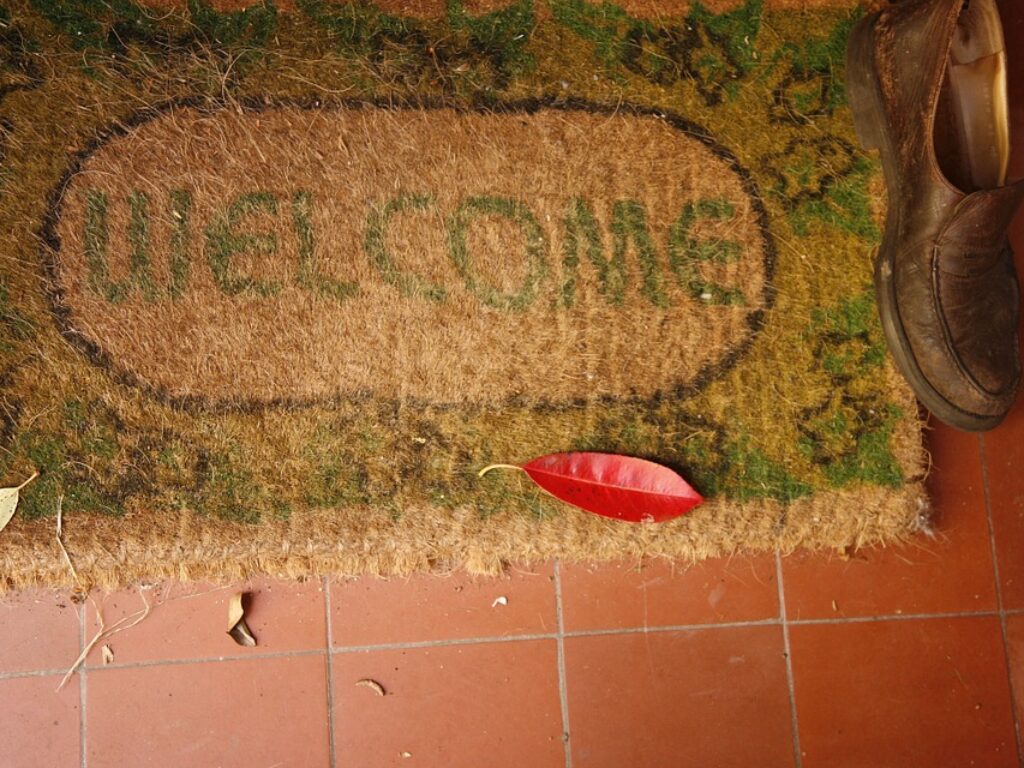Language of Knocks

Joshua Hearne, and his wife Jessica, are two of the founding leaders and members of an intentional, Christian community called Grace and Main Fellowship (graceandmain.org) in Danville, VA. Their work is the cultivation of community alongside people experiencing homelessness, hunger, poverty, addiction, and other social injustices. Joshua is also the Executive Director of Third Chance Ministries.
We disabled our doorbell when our daughter was born, because with her birth we instantly became conservators of a precious resource: baby sleep. Since we live in a hospitality house where many gather, rest, and take shelter, not having a doorbell was a challenge at first, but we have all become fluent in the language of knocks. There are the loud, hard, pounding knocks that describe numb hands or agitation. There are the soft knocks on the storm door that whisper anxiety and timidity—perhaps a sister who’s not sure if what she’s heard about this place is true. There are the insistent, rapid knocks that seem to scream loss or desperation. There are the rhythmic knocks—“shave and a haircut” being the favorite by far—that promise a friendly conversation and maybe a cup of coffee on the porch.
Our household—both families and those staying in the hospitality room—fall easily into a game of guessing who might be at the door by the knock we hear. Some of our brothers and sisters have knocks as distinct as their personalities. I’ve learned another important thing by learning the language of knocks—something important about myself:
I don’t always want to answer the door.
As covenanted members of Grace and Main, we have committed ourselves—both individually and as an intentional community—to opening our homes to the folks God introduced into our lives. But, after a while, hospitality ends up meaning much more than spare bedrooms and open chairs at dinner tables. As we made our home and life in a place with the commitment to be open to who and what God brings us, we’ve found that hospitality also means opening our lives to others and their stories. We’ve had so many great stories that begin with a knock on a door—stories of lives changed and overflowing redemption and resurrection. We’ve also had our fair share of heartbreaking stories that begin with a knock. After a long day or right after the baby has gone down to bed, the stories of heartbreak are what feed my imagination when a knock announces a visitor.
In the practice of hospitality, we’ve learned that it can feel like a holy opportunity to prepare a hospitality room for another guest to join the house and, simultaneously, a frustrating imposition to have to answer the door yet again for another brother or sister while you’re trying to dust, make the bed, and clean up the baby’s toys. In the space of a breath, our quiet confidence and faith can turn to anxious doubt and “what ifs” when we hear a distinctive knock that promises one of our brothers or sisters who has relapsed or threatened someone we love.
Yes, we’ve learned to speak the language of knocks and found that we don’t always like what it has to say about us.
We’ve also discovered that it’s not just our sisters and brothers who wait for us on the porch with hopeful expectation in their hearts, but the Gospel waits for us there, as well. With each knock comes a summons to hear the good news that God is at work in this messy world and that sin is being undone by love—sometimes gloriously fast, and sometimes agonizingly slow. Each knock is an invitation to place our faith and trust in God and be born again. Each knock is a call to prayer, inviting us to pray to the God of the widow, orphan, stranger, and outcast. Each knock is an occasion once again to prepare the way of the Lord and make His paths straight. Each knock is a chance to welcome Jesus into our lives once again. With some knocks, we welcome Jesus into our home in the guise of a friend. With other knocks, we find Jesus waiting on our porch, looking like a stranger.
The folks waiting at our door certainly want us to answer their knock, especially when it’s frigid. We don’t always want to open the door, but we do it—not because we are “good people,” but because salvation is on the other side of our storm door, knocking and waiting.
